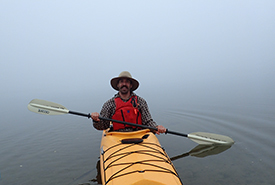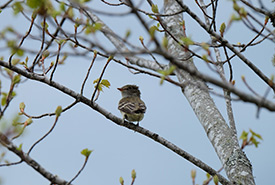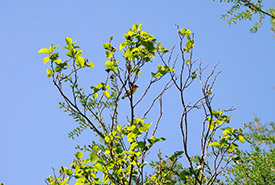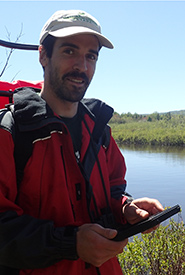You don't have to be a scientist

Evan Young kayaking (Photo by NCC)
As an amateur naturalist, I’ve found it’s easy to learn new things; however, it’s getting much harder to retain everything I learn.
Growing up on a farm in rural Nova Scotia, I’ve always had a passion for the outdoors, catching frogs, snakes and various salamanders.

An alder flycatcher during our Walk and Talk event at Black River Bog in Cape Breton, NS (Photo by NCC)
Though I never really dreamed that I could make a living out of loving the outdoors, I backyard birdwatched for fun while pursuing a career in carpentry. This gradually led me down a path of self-discovery: life is too short to spend it on something you aren’t passionate about. This progressed into volunteering with the Nature Conservancy of Canada (NCC) twice in 2017 at Gaff Point and on Brier Island, followed by going back to school at Holland College in their wildlife conservation technology program. My internship with NCC has provided me with the platform to learn from colleagues about everything from grasses to ecosystem classifications and so much more.
“Study hard what interests you the most in the most undisciplined, irreverent and original manner possible.”― Richard Feynman
With each passing field day, I pick up on more details about the species we share this planet with. The uniqueness of individual species tends to be viewed as all the same until you really open your eyes and take a closer look. For example, not all ferns are the same. No matter how similar they look to the untrained eye, they’re still vastly distinct from one another. I personally only knew of seven ferns from my first year at college, but during my time with NCC I have almost doubled my list.
A walk through the woods now will never be the same as when I was a child. There’s still the same grandeur and mystery of it, but it feels as though my eyes are finally starting to open to the reality of the beauty that surrounds us. Next time you’re out for a walk, move a bit slower, take a deep breath and look around. Walk up to a tree, put your hands on its bark. Is it smooth or rough, peeling or grooved? Maybe it has something growing on it that you never noticed before. Possibly a shield lichen or a shelf fungi.
Take a look up into the canopy. Are there any birds calling or bugs flying around? Don’t simply get drawn toward the loudest noise (probably a blue jay) or the biggest bug. Listen closer, breathe slower, look deeper. They are there, waiting to be discovered. Maybe you walked near an unfamiliar plant on your way to the tree. Now that your eyes are starting to open, think to yourself, “How have I never seen this flower before?”

A blackburnian warbler in Cape Breton, NS (Photo by NCC)
Spending time in the field with others more knowledgeable than yourself will most certainly lead to new discoveries. At NCC’s Black River Bog property in Cape Breton, NS, I had the privilege of seeing my first Canada warbler. I was also graced with a visit from several blackburnian warblers, which was also a first for me. I was ecstatic!
Join community groups, volunteer with a watershed or charity, take a short course that interests you. If you haven’t had the chance to get out in the field much, be inspired by those who make the time for it.
Social media is a great platform for exploration, but it can’t compare to seeing a new species of bird for the first time, or the first time you see a yellow spotted salamander swimming at night, or hear a barred owl calling, or when you realize that the noise you hear every spring isn’t an insect and that it is actually a spring peeper (a very small tree frog with a big voice!).
Believe me, you’re not alone in this feeling of wonder. I feel this way almost every time I go outside, and the more I explore, the more I’m drawn to it.
Nature can be delicate, elegant, violent and gruesome, which makes it such a diverse area of study and worthy of our attention and conservation efforts.


